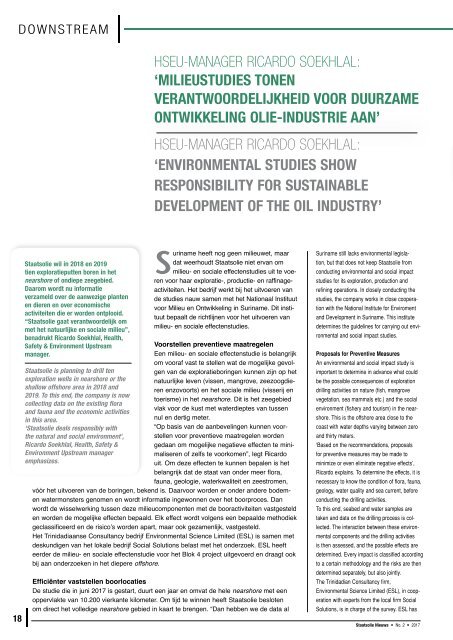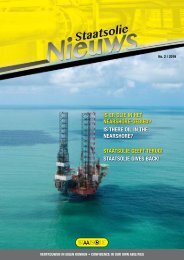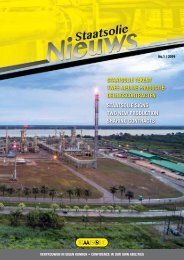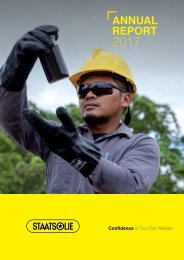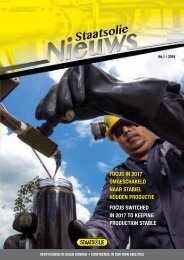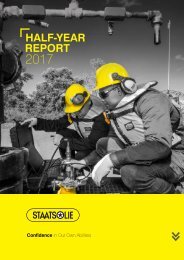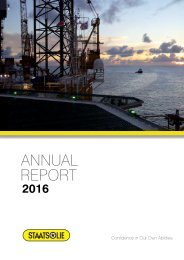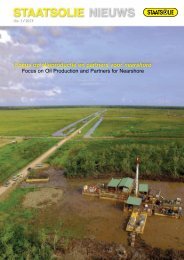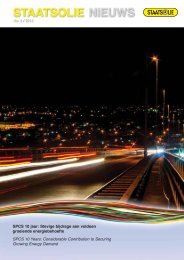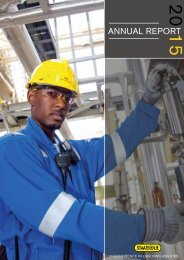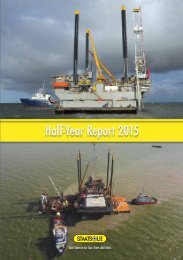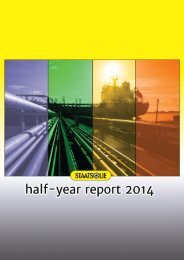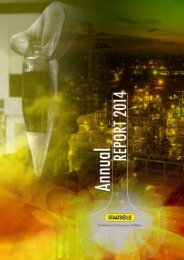Staatsolie Nieuws Oktober 2017
Create successful ePaper yourself
Turn your PDF publications into a flip-book with our unique Google optimized e-Paper software.
DOWNSTREAM<br />
HSEU-MANAGER RICARDO SOEKHLAL:<br />
‘MILIEUSTUDIES TONEN<br />
VERANTWOORDELIJKHEID VOOR DUURZAME<br />
ONTWIKKELING OLIE-INDUSTRIE AAN’<br />
HSEU-MANAGER RICARDO SOEKHLAL:<br />
‘ENVIRONMENTAL STUDIES SHOW<br />
RESPONSIBILITY FOR SUSTAINABLE<br />
DEVELOPMENT OF THE OIL INDUSTRY’<br />
18<br />
<strong>Staatsolie</strong> wil in 2018 en 2019<br />
tien exploratieputten boren in het<br />
nearshore of ondiepe zeegebied.<br />
Daarom wordt nu informatie<br />
verzameld over de aanwezige planten<br />
en dieren en over economische<br />
activiteiten die er worden ontplooid.<br />
“<strong>Staatsolie</strong> gaat verantwoordelijk om<br />
met het natuurlijke en sociale milieu”,<br />
benadrukt Ricardo Soekhlal, Health,<br />
Safety & Environment Upstream<br />
manager.<br />
Suriname heeft nog geen milieuwet, maar<br />
dat weerhoudt <strong>Staatsolie</strong> niet ervan om<br />
milieu- en sociale effectenstudies uit te voeren<br />
voor haar exploratie-, productie- en raffinageactiviteiten.<br />
Het bedrijf werkt bij het uitvoeren van<br />
de studies nauw samen met het Nationaal Instituut<br />
voor Milieu en Ontwikkeling in Suriname. Dit instituut<br />
bepaalt de richtlijnen voor het uitvoeren van<br />
milieu- en sociale effectenstudies.<br />
Voorstellen preventieve maatregelen<br />
Een milieu- en sociale effectenstudie is belangrijk<br />
om vooraf vast te stellen wat de mogelijke gevolgen<br />
van de exploratieboringen kunnen zijn op het<br />
<strong>Staatsolie</strong> is planning to drill ten<br />
exploration wells in nearshore or the natuurlijke leven (vissen, mangrove, zeezoogdieren<br />
enzovoorts) en het sociale milieu (visserij en<br />
shallow offshore area in 2018 and<br />
2019. To this end, the company is now<br />
toerisme) in het nearshore. Dit is het zeegebied<br />
collecting data on the existing flora<br />
vlak voor de kust met waterdieptes van tussen<br />
and fauna and the economic activities<br />
in this area.<br />
nul en dertig meter.<br />
‘<strong>Staatsolie</strong> deals responsibly with<br />
“Op basis van de aanbevelingen kunnen voorstellen<br />
voor preventieve maatregelen worden<br />
the natural and social environment’,<br />
Ricardo Soekhlal, Health, Safety &<br />
gedaan om mogelijke negatieve effecten te minimaliseren<br />
of zelfs te voorkomen”, legt Ricardo<br />
Environment Upstream manager<br />
emphasizes.<br />
uit. Om deze effecten te kunnen bepalen is het<br />
belangrijk dat de staat van onder meer flora,<br />
fauna, geologie, waterkwaliteit en zeestromen,<br />
vóór het uitvoeren van de boringen, bekend is. Daarvoor worden er onder andere bodemen<br />
watermonsters genomen en wordt informatie ingewonnen over het boorproces. Dan<br />
wordt de wisselwerking tussen deze milieucomponenten met de booractiviteiten vastgesteld<br />
en worden de mogelijke effecten bepaald. Elk effect wordt volgens een bepaalde methodiek<br />
geclassificeerd en de risico’s worden apart, maar ook gezamenlijk, vastgesteld.<br />
Het Trinidadiaanse Consultancy bedrijf Environmental Science Limited (ESL) is samen met<br />
deskundigen van het lokale bedrijf Social Solutions belast met het onderzoek. ESL heeft<br />
eerder de milieu- en sociale effectenstudie voor het Blok 4 project uitgevoerd en draagt ook<br />
bij aan onderzoeken in het diepere offshore.<br />
Efficiënter vaststellen boorlocaties<br />
De studie die in juni <strong>2017</strong> is gestart, duurt een jaar en omvat de hele nearshore met een<br />
oppervlakte van 10.200 vierkante kilometer. Om tijd te winnen heeft <strong>Staatsolie</strong> besloten<br />
om direct het volledige nearshore gebied in kaart te brengen. “Dan hebben we de data al<br />
Suriname still lacks environmental legislation,<br />
but that does not keep <strong>Staatsolie</strong> from<br />
conducting environmental and social impact<br />
studies for its exploration, production and<br />
refining operations. In closely conducting the<br />
studies, the company works in close cooperation<br />
with the National Institute for Enviroment<br />
and Development in Suriname. This institute<br />
determines the guidelines for carrying out environmental<br />
and social impact studies.<br />
Proposals for Preventive Measures<br />
An environmental and social impact study is<br />
important to determine in advance what could<br />
be the possible consequences of exploration<br />
drilling activities on nature (fish, mangrove<br />
vegetation, sea mammals etc.) and the social<br />
environment (fishery and tourism) in the nearshore.<br />
This is the offshore area close to the<br />
coast with water depths varying between zero<br />
and thirty meters.<br />
‘Based on the recommendations, proposals<br />
for preventive measures may be made to<br />
minimize or even eliminate negative effects’,<br />
Ricardo explains. To determine the effects, it is<br />
necessary to know the condition of flora, fauna,<br />
geology, water quality and sea current, before<br />
conducting the drilling activities.<br />
To this end, seabed and water samples are<br />
taken and data on the drilling process is collected.<br />
The interaction between these environmental<br />
components and the drilling activities<br />
is then assessed, and the possible effects are<br />
determined. Every impact is classified according<br />
to a certain methodology and the risks are then<br />
determined separately, but also jointly.<br />
The Trinidadian Consultancy firm,<br />
Environmental Science Limited (ESL), in cooperation<br />
with experts from the local firm Social<br />
Solutions, is in charge of the survey. ESL has<br />
<strong>Staatsolie</strong> <strong>Nieuws</strong> • No. 2 • <strong>2017</strong>


